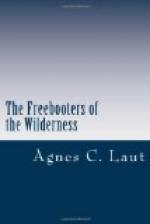The little pack mule took to the trail ears back at an easy lope; and the riders set off up the Pass at the rocking-chair trot of the plains-horseman. Gradually, the mountains crowded closer, in weather-stained rock walls, with a far whish as of wind or waters coming up from the canyon bottom; the sky overhead narrowing to a cleft of blue with the frayed pines and hemlocks hanging from the granite blocks, fragile as ferns against the sky. You looked back; the rocks had closed to a solid wall; you looked down; the river filling the canyon with a hollow hush had dwarfed to a glistening silver thread with the forest dwarfed banks of moss. It was a sombre world, all the more shadowy from that cleft of blue over head where an eagle circled with lonely cry.
The Pass was like the passage of birth and death from life to larger life. On the other side of the mountain lay the sun-bathed Valley and the Ridge with its silver cataracts and the opal peak with the glistening snow cross. This side, the Mountain in the Valley of the Shadow became giant beveled masonry, tier on tier, criss-crossed and scarred by the iced cataracts of a billion years—no sound but the raucous scream of the lone eagle, the hollow hush of the far River, the tinkling of the water-drip freezing as it fell. Then, where the cleft of blue smote the rocks with sunlight, the doors of the mountains would open again to larger life in another Valley.
The horses were no longer trotting. They were climbing and blowing and pausing where the trail of the Pass took sharp turns, back and forward, up and up, till the eagle was circling below. Both men had dismounted and were walking Indian file to the rear, Wayland carrying his own cased rifle. The trail was now running along the edge of an escarpment no wider than a saddle, sheer drop below, sheer wall above.
“How would they come out from the gully on this trail, Wayland? I have been watching for the tracks. They’re not ahead of us.”
“Gully ends in a blind wall above. As I make it, they’d push their nags up and come down on the Pass trail somewhere below the precipice ahead. We can take our time; I have been watching. There are no tracks ahead. The trail above is worse than this. Devil takes care of his own; or they would have broken their necks long ago coming back and forward. We’ll let ’em go down to the lake first. They’ll go into the trap. It’s a lake mostly ice this time of the year. There’s an old punt sometimes used by hunters. It’ll take them an hour to cross with their horses. We’ll let them camp at the lake. We could pot them there, if we had a sheriff worth his salt.”
“’Tis a great trail, Wayland! Minds me of my days building bridges in the Rockies! ‘Tisn’t just a matter o’ courage to follow these precipice trails: it’s temperament! ‘Tis something in the pit o’ the stomach! A mind one of our best engineers; he could meet Chinese navvies with their knives out: couldn’t cross one of the precipices to save his life without blinders like a horse: we had to blindfold him so he wouldn’t know till he’d crossed. How deep do you call it here?”




